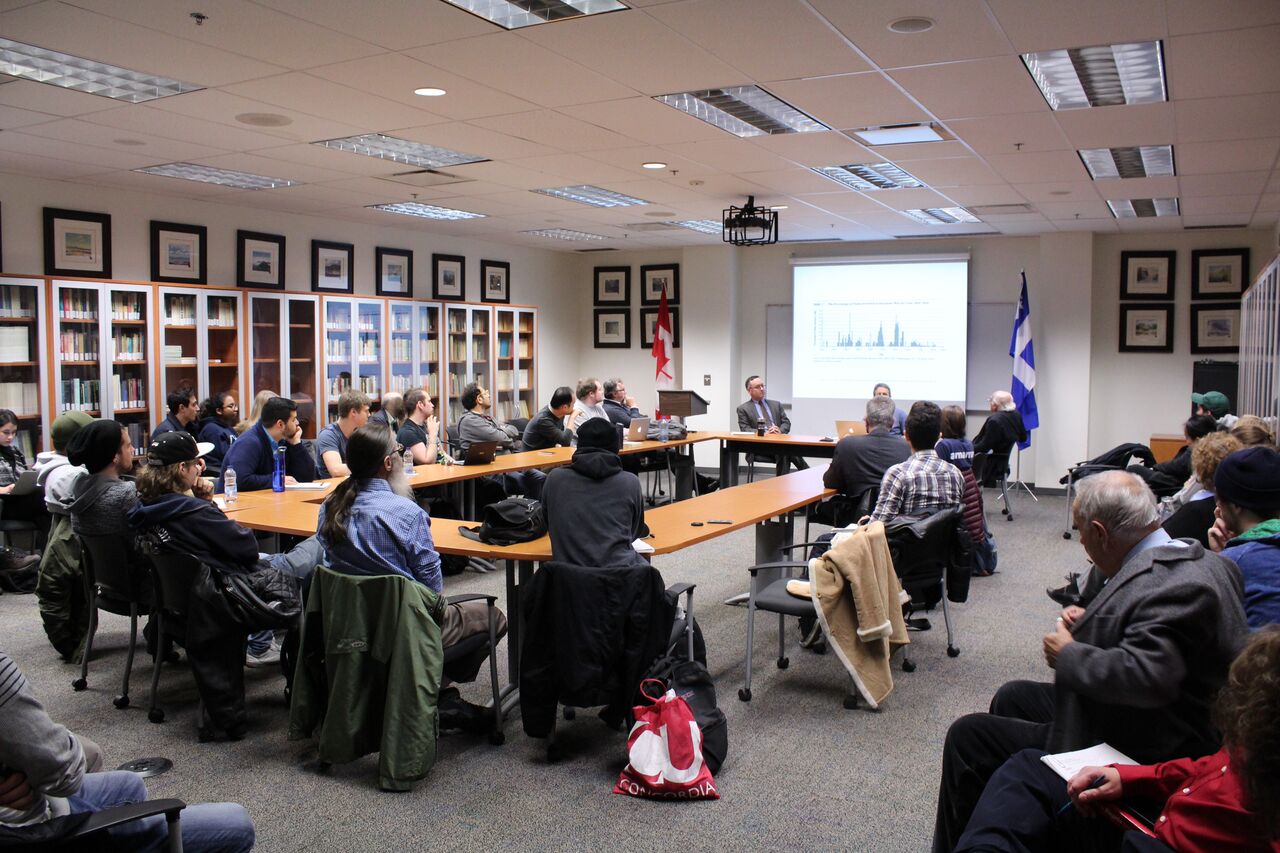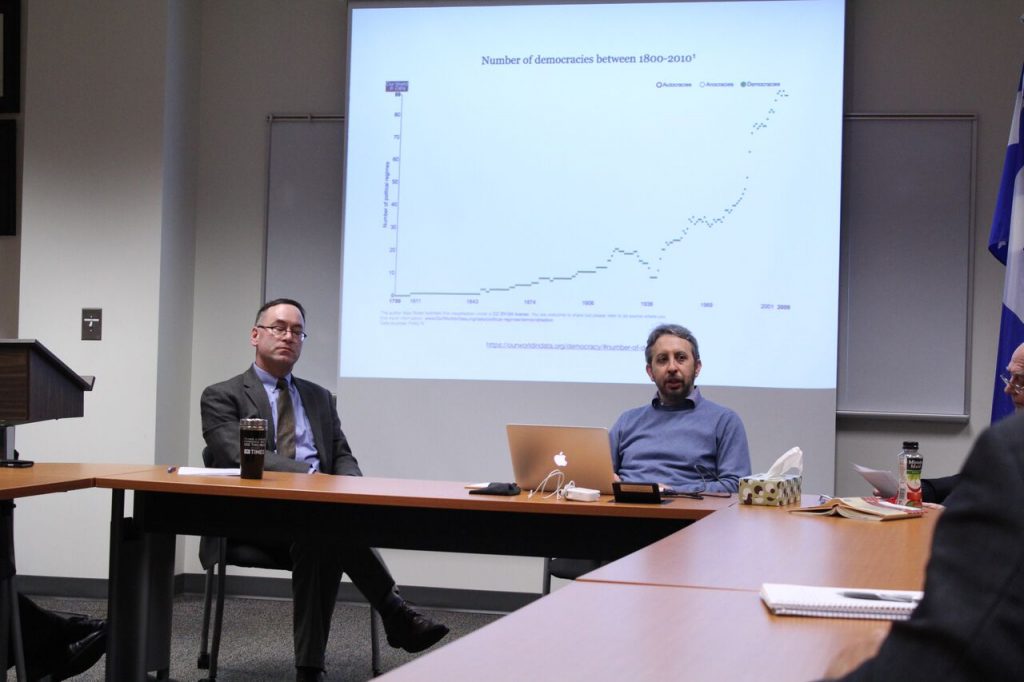Concordia political science professors explained why the elections unfolded the way they did
Professors from Concordia’s department of political science broke down the domestic, international and economic implications of a Trump presidency and the factors that led to his election at the “Understanding the 2016 U.S. Elections” roundtable in the Hall building on Nov. 16.
The speakers included professor Graham Dodds, who specializes in American politics and law, professor Michael Lipson, who specializes in international relations and international organizations, professor Harold Chorney, who specializes in political economy, urbanization and globalization, and Guy Lachapelle, who specializes in public policy and political communication.
Trump won 290 of the 270 electoral college votes needed to become president of the United States. However, Hillary Clinton won 232 of the electoral votes and surpassed Donald Trump by more than 1.7 million popular votes, said Dodds.
To explain the disparity between the electoral college votes and the popular votes, Dodds said some people looked at the characteristics of Clinton’s supporters.
One such characteristic was that her supporters were too densely located in particular cities, rather than dispersed in key locations throughout the country.
In addition, low voter turnout was another factor used to explain why the election unfolded the way it did, said Dodds.
“Some 100 million people eligible to vote in the U.S. federal election didn’t,” said Dodds.
More than five million Americans voted for a third party candidate rather than for Clinton or Trump, according to CNN. This could have impacted the outcome of the election throughout the country, said Dodds.
According to CNN, the 2016 election saw the lowest voter turnout in a presidential election since 1996. Only 58 per cent of eligible voters actually voted in this election, versus the 62 per cent who voted in 2008, said Dodds.
“Others said that U.S. polling was atrocious, and others claimed the economic decline in the Midwest as a factor behind Trumps support. Where underclass whites in the rust belt felt scared of the slipping of their privilege and did not share the incredible economic [boost] since 2008,” said Dodds.
Lachapelle discussed the impact of populism and the implications Trumps presidency might have on Quebec and Canada, as well as Americans’ unhappiness with the current U.S political system.
“Many Americans were disappointed with Obama and Obamacare, and 30 million Americans are still not covered,” said Lachapelle. “Obamacare was not what Obama had intended at the beginning of his presidency.”
“Minorities were unhappy with the current system, which could help account for their low turnout,” Lachapelle said.
“Many of Trump’s supporters hoped that, at end of the day, he would break old divides,” Dodds added. “[However], his new appointments, such as Mike Pence as vice president, don’t follow this. [They’re] elevating not the new way but the hard way.”
“Trump won despite deep divides in his own party,” Dodds said. “It is difficult to tell what will happen now because Trump provided few details of his plan and, when he did, he often contradicted himself.”
For example, Trump announced that he no longer plans to go forward with building a large wall across the U.S and Mexican border, instead he now plans to have a smaller fence, said professor Dodds. In an interview with 60 minutes, Trump has also announced that he will reduce the total deportation of all illegal immigrants to only immigrants who have criminal records.
Lipson discussed the potential international implications Trump’s presidency could have.
“Trump plans to back out of the December Paris Treaty,” he said. “ Americans abandoning the Paris Treaty would be catastrophic for the global environment.”
Lipson also discussed how president-elect Trump’s stance on foreign policy has been consistent throughout past decades.
“Trump believes international economics should not be about cooperation but [rather] bargaining, where one side is the victor and the other sides’ lose,” Lipson said. “In addition, Trump’s preference for authoritarian regimes, such as Vladimir Putin’s, has been consistent throughout Trump’s adult life.”
Chorney discussed the positive economic consequences Trump’s presidency could have.

“Trump plans to change the tax code dramatically from six-seven brackets down to three,” said Chorney.
During Trump’s presidential campaign, he proposed to decrease corporate taxes by 20 per cent, setting them at 15 per cent compared the 35 per cent set by Obama’s administration.
“The impact of [tax cuts] would result in less tax revenue for the government,” Chorney said.
“Trump wants low rates of interest and he has stated that he wants to [remove the] head of federal reserve, Janet L. Yellen, and spend $1 trillion on infrastructure,” said Chorney, highlight that this is positive.
In contrast, “Hillary wanted to spend $300 billion on infrastructure, which, in the size of global economy, would be too small,” said Chorney.
In addition, he confessed Trump’s brilliance as a “New York City realtor who worked with people from all cultural backgrounds.”
Chomey stated that 75 per cent of Canada’s exports are from the U.S which makes up 35 per cent of our Gross Domestic Product. (GDP), enforcing how important of an ally U.S. is to Canada.
Furthermore, Dodds suggested that some people believe Trump’s presidency would closely resemble Richard Nixon’s third term.
“Nixon came from an early wave of an era of conservative dominance,” he said.
During his presidency, Nixon notably donated $100 million to help the urban poor and was also notorious for embracing racism and law and order through his War on Drugs Program.
The roundtable organized by Concordia Political Science professors helped to provide context on the potential implications Trump’s presidency may have.





